高中英语人教版(新课程标准)必修三 Unit 4: Astronomy:Discovering Useful Structures课件(28张ppt)
文档属性
| 名称 | 高中英语人教版(新课程标准)必修三 Unit 4: Astronomy:Discovering Useful Structures课件(28张ppt) |

|
|
| 格式 | pptx | ||
| 文件大小 | 614.0KB | ||
| 资源类型 | 教案 | ||
| 版本资源 | 人教版(新课程标准) | ||
| 科目 | 英语 | ||
| 更新时间 | 2021-04-28 16:56:28 | ||
图片预览

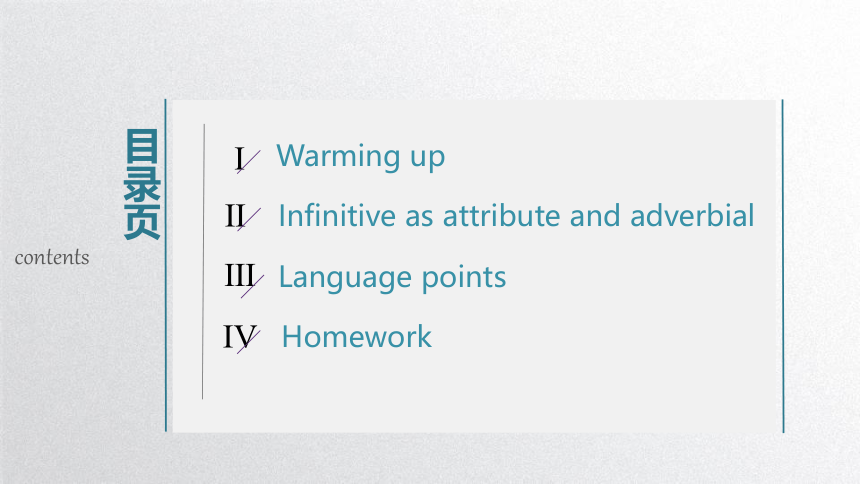
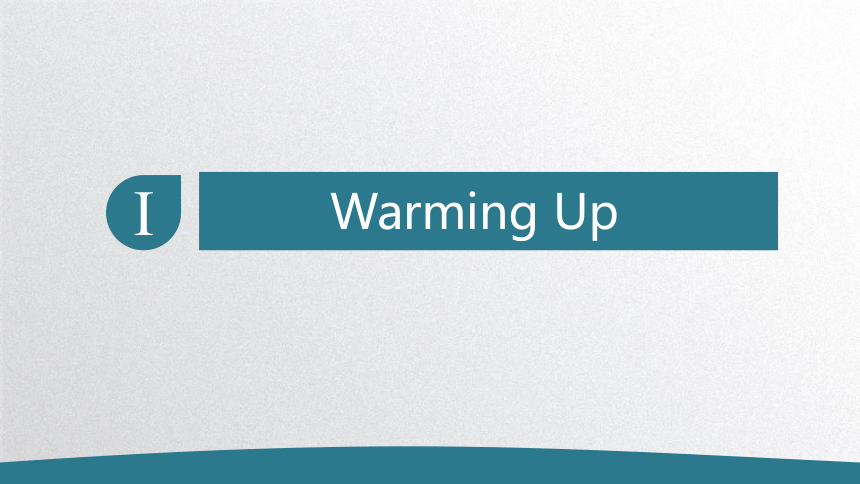
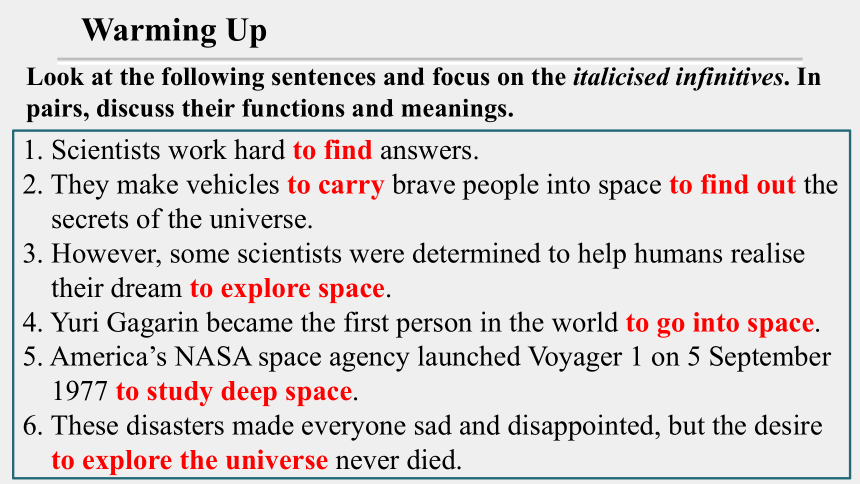
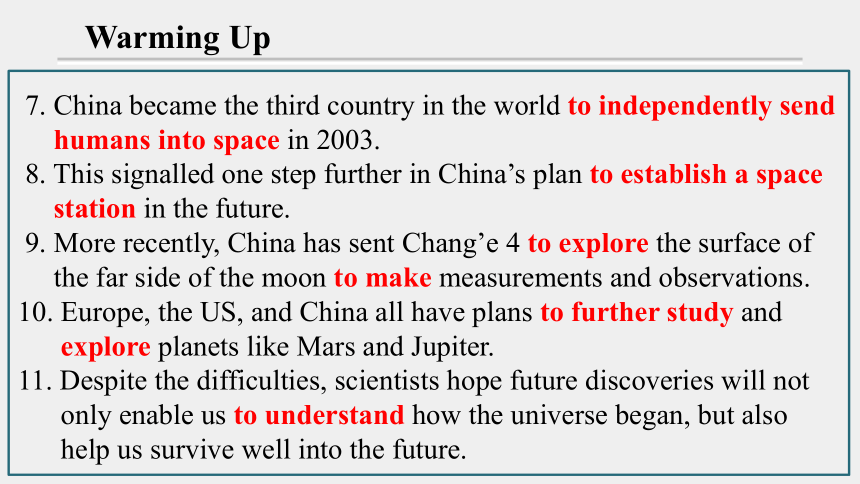
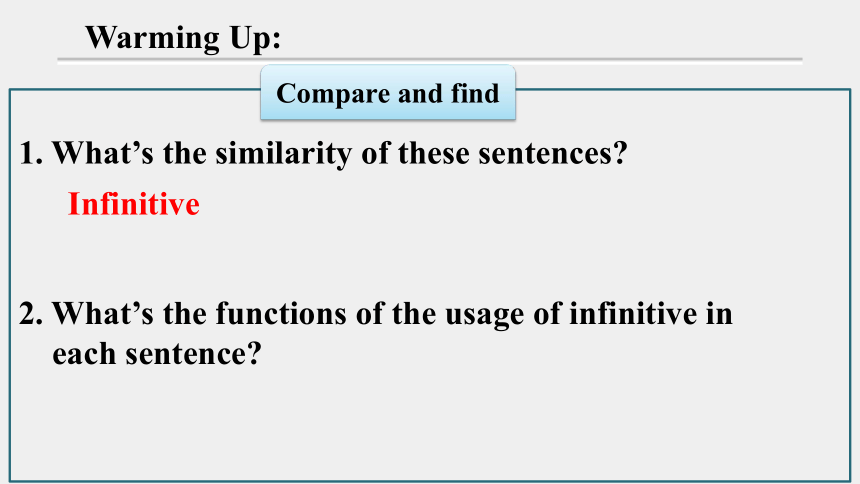
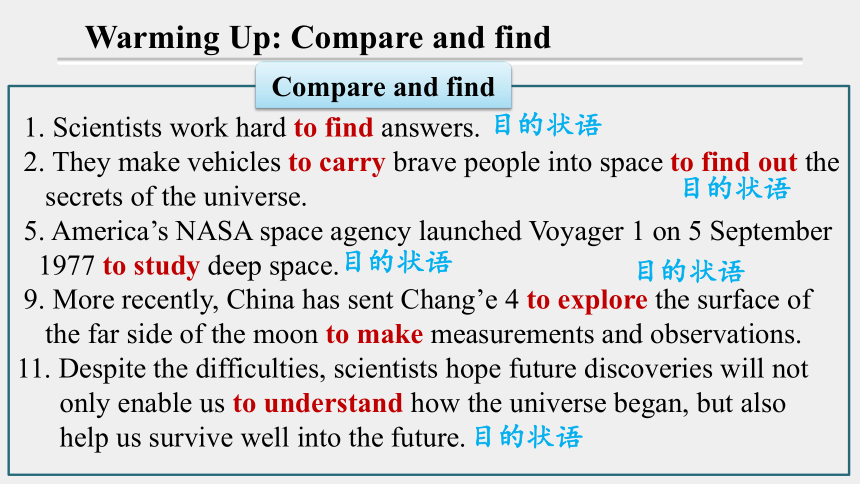
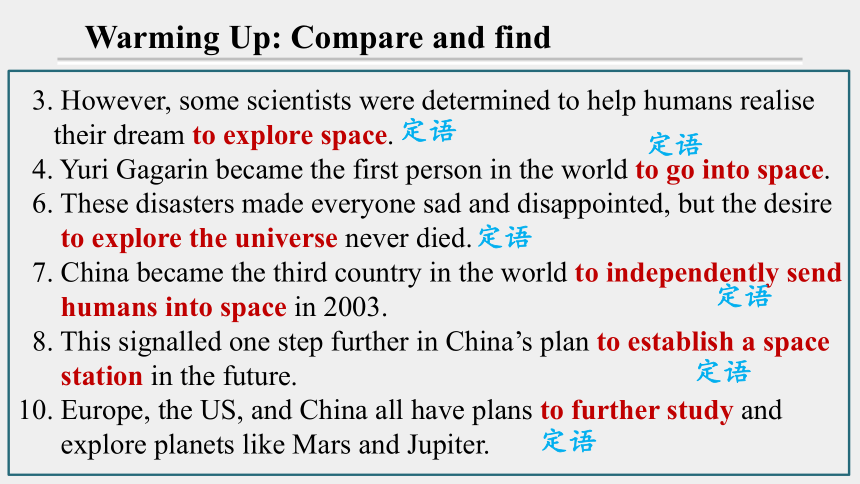

文档简介
Discovering Useful Structures
【版本:新人教 册别:必修三】
Unit 4 SPACE EXPLORATION
目录页
contents
Warming up
Ⅰ
Language points
Infinitive as attribute and adverbial
Ⅱ
Homework
Ⅲ
Ⅳ
Ⅰ
Warming Up
1. Scientists work hard to find answers.
2. They make vehicles to carry brave people into space to find out the
secrets of the universe.
3. However, some scientists were determined to help humans realise
their dream to explore space.
4. Yuri Gagarin became the first person in the world to go into space.
5. America’s NASA space agency launched Voyager 1 on 5 September
1977 to study deep space.
6. These disasters made everyone sad and disappointed, but the desire
to explore the universe never died.
Warming Up
Look at the following sentences and focus on the italicised infinitives. In pairs, discuss their functions and meanings.
7. China became the third country in the world to independently send
humans into space in 2003.
8. This signalled one step further in China’s plan to establish a space
station in the future.
9. More recently, China has sent Chang’e 4 to explore the surface of
the far side of the moon to make measurements and observations.
10. Europe, the US, and China all have plans to further study and
explore planets like Mars and Jupiter.
11. Despite the difficulties, scientists hope future discoveries will not
only enable us to understand how the universe began, but also
help us survive well into the future.
Warming Up
1. What’s the similarity of these sentences?
2. What’s the functions of the usage of infinitive in
each sentence?
Infinitive
Warming Up:
Compare and find
1. Scientists work hard to find answers.
2. They make vehicles to carry brave people into space to find out the
secrets of the universe.
5. America’s NASA space agency launched Voyager 1 on 5 September
1977 to study deep space.
9. More recently, China has sent Chang’e 4 to explore the surface of
the far side of the moon to make measurements and observations.
11. Despite the difficulties, scientists hope future discoveries will not
only enable us to understand how the universe began, but also
help us survive well into the future.
目的状语
目的状语
目的状语
目的状语
目的状语
Warming Up: Compare and find
Compare and find
3. However, some scientists were determined to help humans realise
their dream to explore space.
4. Yuri Gagarin became the first person in the world to go into space.
6. These disasters made everyone sad and disappointed, but the desire
to explore the universe never died.
7. China became the third country in the world to independently send
humans into space in 2003.
8. This signalled one step further in China’s plan to establish a space
station in the future.
10. Europe, the US, and China all have plans to further study and
explore planets like Mars and Jupiter.
定语
定语
定语
定语
定语
定语
Warming Up: Compare and find
Ⅱ
Infinitive as attribute
and adverbial
1. We must find a person to do the work.
2. There are lots of interesting things to see.
3. They got the order to leave the city.
一、不定式作定语的位置和关系:
·动词不定式作定语通常放在名词、代词或不定代词的后面作后置定语。
· 动词不定式作定语一般与所修饰的名词构成主谓关系、动宾关系、或同位关系。
主谓关系
动宾关系
同位关系
Infinitive as attribute
1. She is the first graduate to get an offer in the big company.
2. He is the only one to survive the accident.
3. He is the right person to do the job.
二、不定式作定语(名词被特定词修饰):
当名词被序数词或 the only, the next, the last, the right修饰,且该名词是作定语的非谓语动词的执行者时,用不定式主动形式作定语。
Infinitive as attribute
1. In the past, women had no chance to go to school.
2. He made an attempt to be admitted to the big company.
3. A good teacher must have the ability to make himself
understood.
4. I must keep the promise to pay on time.
5. His eagerness to get back home was quite obvious.
三、不定式作定语与特定名词连用:
有些名词常跟不定式作定语,如:wish, decision, chance, promise, plan, time, attempt, effort, ability, eagerness等。
Infinitive as attribute
1. Give me a pen to write with.
2. He is looking for a room to live in.
3. There is nothing to worry about.
4. Here is a piece of paper for you to write on.
四、不定式加介词作定语:
作定语的动词不定式如果是不及物动词或者不定式所修饰的名词或代词是不定式动作的地点、工具等,不定式后面须有相应的介词。
Infinitive as attribute
1. I have a lot of things to do tomorrow.
2. Please give me something to drink.
3. He will show you the right path to take.
拓展与补充一:
在一些固定句型中,动词不定式作定语用主动形式表被动意义,如 have / get / give / show sth to do。
在此类句型中,不定式与前面的名词构成动宾关系,和句中另一个名词或代词构成主谓关系。
I do a lot of things. / I drink something. / You take the right path.
Infinitive as attribute
1. Do you have any clothes to wash?
2. Kids, do you have any clothes to be washed?
3. I can’t go out this afternoon, because I have many
materials to type.
4. The boss told me that he had many materials to be typed.
试比较1、2句和3、4句的区别是什么?
Infinitive as attribute
当不定式与前面的名词构成动宾关系,且和句中的主语构成逻辑上的主谓关系时,用主动形式表被动意义;若没有逻辑上的主谓关系且不确定逻辑主语是谁时,仍用被动语态。
1. There is a lot of homework to do.
2. There is a lot of homework to be done.
3. There is nothing to see.
4. There is nothing to be seen.
拓展与补充二:
Infinitive as attribute
在there be + n + to do 结构中,可用不定式的主动形式也可用被动形式,只是意义和侧重点不同,to do强调人,其逻辑主语是动作的发出者,to be done强调物,其逻辑主语是动作的承受者。
{C4B1156A-380E-4F78-BDF5-A606A8083BF9}
主动语态
被动语态
一般式
to do
to be done
进行式
to be doing
完成式
to have done
to have been done
完成进行式
to have been doing
动词不定式的时态和语态
Infinitive as attribute: Summary
1. The airport ______________ (complete) next year will help promote tourism in this area. (2013 四川改)
2. We are having a meeting in half an hour. The decision _________ (make) at the meeting will influence the future of our company. (2012 重庆)
3. Volunteering gives you a chance _________ (change) lives, including your own. (2013 北京)
4. The students are looking forward to having an opportunity _________ (explore) society of real-life experience. (2013 上海)
5. I have a lot of readings __________ (complete) before the end of this term. (2010 山东)
to be completed
to be made
to change
Infinitive as attribute: Exercise
高考链接
to explore
to complete
6. The play ______________ (produce) next month aims mainly to reflect the local culture. (2009 安徽)
7. The ability _________ (express) an idea is as important as the idea itself. (2011 湖南)
8. It’s important for the figures ____________ (update) regularly. (2011 北京)
9. Birds’ singing is sometimes a warning to other birds ______ (stay) away. (2012 北京)
10. It’s standard practice for a company like this one _________ (employ) a security officer. (2014 山东)
to be produced
Infinitive as attribute: Exercise
to express
to stay
to be updated
to employ
1. To make friends easily, you need to be very kind.
2. They went there to save people who were injured.
3. More TV programmes were produced to raise people’s concern over food safety.
4. To / In order to catch the first bus, he got up early.
5. The bus stopped so as to pick up passengers.
不定式作目的状语,可用in order to / so as to 代替,有时为了突出强调目的,还可将这个词组置于句首,但so as to一般不用于句首。
Infinitive as adverbial
1. He woke up to find everybody gone.
2. He arrived at the train station, only to find the train had
already left.
3. She is too tired to do the job.
4. He is old enough to go to school.
5. Will you be so kind as to open the window?
不定式作结果状语,表示出乎意料的结果;有时也可用only to, too ... to, enough to, so ... as to 来表示结果状语。
Infinitive as adverbial
1. I am so excited to be here!
2. I am more than delighted to be with you!
3. She is proud to have won the first place.
4. He is glad to be invited to the meeting.
不定式作原因状语,常用于“主语 + be + 形容词 + to do”结构中,此类形容词多是glad, excited, disappointed, shocked等表示喜怒哀乐的形容词。
Infinitive as adverbial
1. ________ (make) it easier to get in touch with us, you’d better keep this card at hand. (2016 北京改)
2. Anxiously, she took the dress out of the package and tried it on, only _______ (find) it didn’t fit. (2014 天津改)
3. Group activities will be organised after class _________ (help) children develop team spirit. (2014 重庆改)
4. George returned after the war, only __________ (tell) that his wife had left him. (2012 山东)
5. This machine is very easy _________ (operate). Anybody can learn to use it in a few minutes. (2012 辽宁)
6. We were astonished _______ (find) the temple still in its original condition. (2010 辽宁)
To make
to find
Infinitive as adverbial: Exercise
to help
高考链接
to be told
to operate
to find
Hello, my dear friends! I am greatly honoured ________ (share) the event with you. The theme of the activity is ___________ (introduce) Chinese traditional culture. During this month, there will be various activities for you ____________ (experience) the rich and colourful Chinese culture. You will have a chance ___________ (make) paper-cutting or ____________ (appreciate) Chinese arts.
There will be some lectures for you _________ (attend), _______ is beneficial to your understanding about China. ________ (learn) more about China, don’t hesitate _________ (contact) us and be the first ________ (sign) up for the activity.
to share
to introduce
to experience
to make
to appreciate
Infinitive as attribute and adverbial: Exercise
语篇演练
to attend
To learn
which
to contact
to sign
Language points
Ⅲ
Language points: Important phrases (P6)
{0505E3EF-67EA-436B-97B2-0124C06EBD24}1
fly airplanes
2
in space
3
realise the dream to explore space
4
get married
5
recycle sth for later use
6
due to the lack of gravity
7
stay healthy
8
keep their bodies under control
开飞机
在太空中
实现探索太空的梦想
结婚
回收某物以备后用
由于缺少引力
保持健康
控制他们的身体
Homework
Ⅳ
1. Do the exercise on P42
and P80 ~ P81.
2. 《阅读 6+1 》
Homework
【版本:新人教 册别:必修三】
Unit 4 SPACE EXPLORATION
目录页
contents
Warming up
Ⅰ
Language points
Infinitive as attribute and adverbial
Ⅱ
Homework
Ⅲ
Ⅳ
Ⅰ
Warming Up
1. Scientists work hard to find answers.
2. They make vehicles to carry brave people into space to find out the
secrets of the universe.
3. However, some scientists were determined to help humans realise
their dream to explore space.
4. Yuri Gagarin became the first person in the world to go into space.
5. America’s NASA space agency launched Voyager 1 on 5 September
1977 to study deep space.
6. These disasters made everyone sad and disappointed, but the desire
to explore the universe never died.
Warming Up
Look at the following sentences and focus on the italicised infinitives. In pairs, discuss their functions and meanings.
7. China became the third country in the world to independently send
humans into space in 2003.
8. This signalled one step further in China’s plan to establish a space
station in the future.
9. More recently, China has sent Chang’e 4 to explore the surface of
the far side of the moon to make measurements and observations.
10. Europe, the US, and China all have plans to further study and
explore planets like Mars and Jupiter.
11. Despite the difficulties, scientists hope future discoveries will not
only enable us to understand how the universe began, but also
help us survive well into the future.
Warming Up
1. What’s the similarity of these sentences?
2. What’s the functions of the usage of infinitive in
each sentence?
Infinitive
Warming Up:
Compare and find
1. Scientists work hard to find answers.
2. They make vehicles to carry brave people into space to find out the
secrets of the universe.
5. America’s NASA space agency launched Voyager 1 on 5 September
1977 to study deep space.
9. More recently, China has sent Chang’e 4 to explore the surface of
the far side of the moon to make measurements and observations.
11. Despite the difficulties, scientists hope future discoveries will not
only enable us to understand how the universe began, but also
help us survive well into the future.
目的状语
目的状语
目的状语
目的状语
目的状语
Warming Up: Compare and find
Compare and find
3. However, some scientists were determined to help humans realise
their dream to explore space.
4. Yuri Gagarin became the first person in the world to go into space.
6. These disasters made everyone sad and disappointed, but the desire
to explore the universe never died.
7. China became the third country in the world to independently send
humans into space in 2003.
8. This signalled one step further in China’s plan to establish a space
station in the future.
10. Europe, the US, and China all have plans to further study and
explore planets like Mars and Jupiter.
定语
定语
定语
定语
定语
定语
Warming Up: Compare and find
Ⅱ
Infinitive as attribute
and adverbial
1. We must find a person to do the work.
2. There are lots of interesting things to see.
3. They got the order to leave the city.
一、不定式作定语的位置和关系:
·动词不定式作定语通常放在名词、代词或不定代词的后面作后置定语。
· 动词不定式作定语一般与所修饰的名词构成主谓关系、动宾关系、或同位关系。
主谓关系
动宾关系
同位关系
Infinitive as attribute
1. She is the first graduate to get an offer in the big company.
2. He is the only one to survive the accident.
3. He is the right person to do the job.
二、不定式作定语(名词被特定词修饰):
当名词被序数词或 the only, the next, the last, the right修饰,且该名词是作定语的非谓语动词的执行者时,用不定式主动形式作定语。
Infinitive as attribute
1. In the past, women had no chance to go to school.
2. He made an attempt to be admitted to the big company.
3. A good teacher must have the ability to make himself
understood.
4. I must keep the promise to pay on time.
5. His eagerness to get back home was quite obvious.
三、不定式作定语与特定名词连用:
有些名词常跟不定式作定语,如:wish, decision, chance, promise, plan, time, attempt, effort, ability, eagerness等。
Infinitive as attribute
1. Give me a pen to write with.
2. He is looking for a room to live in.
3. There is nothing to worry about.
4. Here is a piece of paper for you to write on.
四、不定式加介词作定语:
作定语的动词不定式如果是不及物动词或者不定式所修饰的名词或代词是不定式动作的地点、工具等,不定式后面须有相应的介词。
Infinitive as attribute
1. I have a lot of things to do tomorrow.
2. Please give me something to drink.
3. He will show you the right path to take.
拓展与补充一:
在一些固定句型中,动词不定式作定语用主动形式表被动意义,如 have / get / give / show sth to do。
在此类句型中,不定式与前面的名词构成动宾关系,和句中另一个名词或代词构成主谓关系。
I do a lot of things. / I drink something. / You take the right path.
Infinitive as attribute
1. Do you have any clothes to wash?
2. Kids, do you have any clothes to be washed?
3. I can’t go out this afternoon, because I have many
materials to type.
4. The boss told me that he had many materials to be typed.
试比较1、2句和3、4句的区别是什么?
Infinitive as attribute
当不定式与前面的名词构成动宾关系,且和句中的主语构成逻辑上的主谓关系时,用主动形式表被动意义;若没有逻辑上的主谓关系且不确定逻辑主语是谁时,仍用被动语态。
1. There is a lot of homework to do.
2. There is a lot of homework to be done.
3. There is nothing to see.
4. There is nothing to be seen.
拓展与补充二:
Infinitive as attribute
在there be + n + to do 结构中,可用不定式的主动形式也可用被动形式,只是意义和侧重点不同,to do强调人,其逻辑主语是动作的发出者,to be done强调物,其逻辑主语是动作的承受者。
{C4B1156A-380E-4F78-BDF5-A606A8083BF9}
主动语态
被动语态
一般式
to do
to be done
进行式
to be doing
完成式
to have done
to have been done
完成进行式
to have been doing
动词不定式的时态和语态
Infinitive as attribute: Summary
1. The airport ______________ (complete) next year will help promote tourism in this area. (2013 四川改)
2. We are having a meeting in half an hour. The decision _________ (make) at the meeting will influence the future of our company. (2012 重庆)
3. Volunteering gives you a chance _________ (change) lives, including your own. (2013 北京)
4. The students are looking forward to having an opportunity _________ (explore) society of real-life experience. (2013 上海)
5. I have a lot of readings __________ (complete) before the end of this term. (2010 山东)
to be completed
to be made
to change
Infinitive as attribute: Exercise
高考链接
to explore
to complete
6. The play ______________ (produce) next month aims mainly to reflect the local culture. (2009 安徽)
7. The ability _________ (express) an idea is as important as the idea itself. (2011 湖南)
8. It’s important for the figures ____________ (update) regularly. (2011 北京)
9. Birds’ singing is sometimes a warning to other birds ______ (stay) away. (2012 北京)
10. It’s standard practice for a company like this one _________ (employ) a security officer. (2014 山东)
to be produced
Infinitive as attribute: Exercise
to express
to stay
to be updated
to employ
1. To make friends easily, you need to be very kind.
2. They went there to save people who were injured.
3. More TV programmes were produced to raise people’s concern over food safety.
4. To / In order to catch the first bus, he got up early.
5. The bus stopped so as to pick up passengers.
不定式作目的状语,可用in order to / so as to 代替,有时为了突出强调目的,还可将这个词组置于句首,但so as to一般不用于句首。
Infinitive as adverbial
1. He woke up to find everybody gone.
2. He arrived at the train station, only to find the train had
already left.
3. She is too tired to do the job.
4. He is old enough to go to school.
5. Will you be so kind as to open the window?
不定式作结果状语,表示出乎意料的结果;有时也可用only to, too ... to, enough to, so ... as to 来表示结果状语。
Infinitive as adverbial
1. I am so excited to be here!
2. I am more than delighted to be with you!
3. She is proud to have won the first place.
4. He is glad to be invited to the meeting.
不定式作原因状语,常用于“主语 + be + 形容词 + to do”结构中,此类形容词多是glad, excited, disappointed, shocked等表示喜怒哀乐的形容词。
Infinitive as adverbial
1. ________ (make) it easier to get in touch with us, you’d better keep this card at hand. (2016 北京改)
2. Anxiously, she took the dress out of the package and tried it on, only _______ (find) it didn’t fit. (2014 天津改)
3. Group activities will be organised after class _________ (help) children develop team spirit. (2014 重庆改)
4. George returned after the war, only __________ (tell) that his wife had left him. (2012 山东)
5. This machine is very easy _________ (operate). Anybody can learn to use it in a few minutes. (2012 辽宁)
6. We were astonished _______ (find) the temple still in its original condition. (2010 辽宁)
To make
to find
Infinitive as adverbial: Exercise
to help
高考链接
to be told
to operate
to find
Hello, my dear friends! I am greatly honoured ________ (share) the event with you. The theme of the activity is ___________ (introduce) Chinese traditional culture. During this month, there will be various activities for you ____________ (experience) the rich and colourful Chinese culture. You will have a chance ___________ (make) paper-cutting or ____________ (appreciate) Chinese arts.
There will be some lectures for you _________ (attend), _______ is beneficial to your understanding about China. ________ (learn) more about China, don’t hesitate _________ (contact) us and be the first ________ (sign) up for the activity.
to share
to introduce
to experience
to make
to appreciate
Infinitive as attribute and adverbial: Exercise
语篇演练
to attend
To learn
which
to contact
to sign
Language points
Ⅲ
Language points: Important phrases (P6)
{0505E3EF-67EA-436B-97B2-0124C06EBD24}1
fly airplanes
2
in space
3
realise the dream to explore space
4
get married
5
recycle sth for later use
6
due to the lack of gravity
7
stay healthy
8
keep their bodies under control
开飞机
在太空中
实现探索太空的梦想
结婚
回收某物以备后用
由于缺少引力
保持健康
控制他们的身体
Homework
Ⅳ
1. Do the exercise on P42
and P80 ~ P81.
2. 《阅读 6+1 》
Homework
同课章节目录
